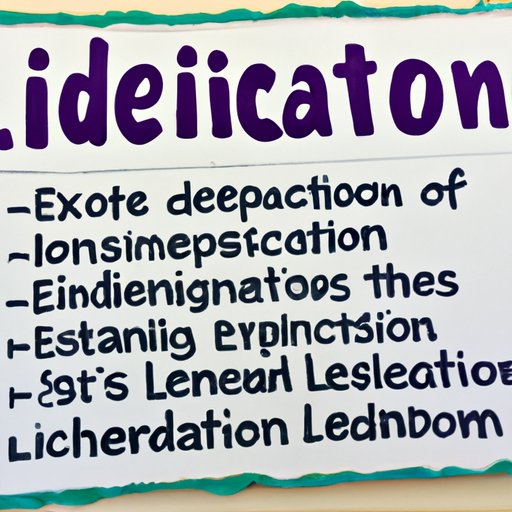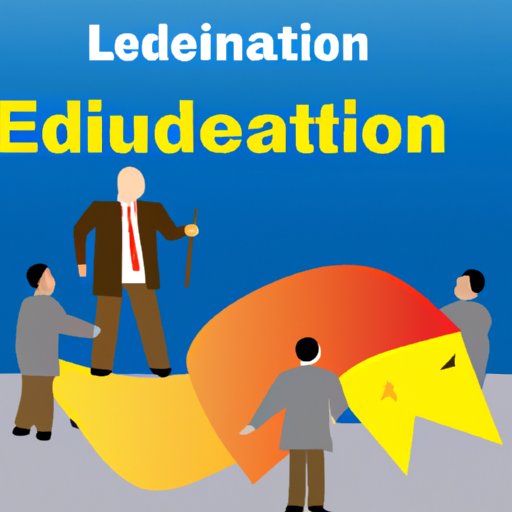Introduction
Instructional leadership in education is an important concept that has become increasingly relevant in recent years. It focuses on the idea of a shared responsibility between school leaders and teachers to promote student learning. Instructional leadership emphasizes the importance of collaboration and communication between school administrators, teachers, and other stakeholders in order to create an environment where students can succeed.
Exploring the Role of Instructional Leadership in Education
Instructional leadership plays a crucial role in the classroom. It involves providing direction and guidance to teachers in order to ensure that they are effectively delivering high-quality instruction to their students. An instructional leader should be able to identify areas of improvement, provide support and resources, and create a collaborative environment where teachers feel valued and supported.
The benefits of having an instructional leader in the classroom are numerous. For example, instructional leaders can provide teachers with the tools and resources necessary to effectively deliver instruction and help them stay up-to-date on the latest research and best practices. Additionally, instructional leaders can help teachers build strong relationships with their students by providing guidance and support.
One of the most important roles of instructional leadership is its impact on student achievement. Instructional leaders can help teachers focus on instructional strategies that will improve student learning outcomes. They can also provide support and resources to teachers to ensure that they are utilizing effective instructional practices. By providing this type of guidance, instructional leaders can help teachers create an environment that is conducive to student success.

Defining Instructional Leadership in Education
In order to understand what instructional leadership is in education, it is important to define its characteristics. Instructional leadership is a set of skills and knowledge that enables educators to lead instruction in an effective and efficient manner. It involves the ability to plan and organize instruction, assess student performance, and provide feedback to teachers and students.
What does it take to be an effective instructional leader? Instructional leaders need to have strong communication and interpersonal skills, as well as a deep understanding of best practices and educational research. Instructional leaders must also be able to motivate and inspire teachers to strive for excellence in the classroom.
Developing instructional leadership skills for educators is essential for school success. Instructional leaders must be able to provide direction and guidance to teachers in order to ensure that they are providing high-quality instruction to their students. Instructional leaders must also be able to develop and implement strategies that will improve student learning outcomes.

Examining the Impact of Instructional Leadership on Student Achievement
It is clear that instructional leadership has a positive effect on student achievement. Studies have shown that instructional leaders who are highly effective at leading instruction are more likely to have students who demonstrate higher levels of academic performance. Instructional leaders can help teachers create an environment where students feel safe and supported, which can lead to increased engagement and motivation.
In addition to creating a positive learning environment, instructional leaders can also help teachers develop and implement effective instructional strategies. Instructional leaders can provide teachers with the resources and support they need to ensure that their students are receiving high-quality instruction. By doing so, instructional leaders can help teachers improve student learning outcomes.
There are several strategies that instructional leaders can use to enhance their effectiveness. These include providing ongoing feedback and support, developing and implementing data-driven instructional strategies, and fostering collaboration among teachers. Additionally, instructional leaders should strive to create a culture of continuous improvement within their schools.
Supporting Teacher Professional Development
Instructional leaders can play an important role in supporting teacher professional development. Instructional leaders can provide teachers with the tools and resources they need to effectively deliver instruction. They can also provide guidance and support to teachers in order to ensure that they are using the most effective instructional strategies.
How can instructional leaders help teachers improve? Instructional leaders can provide teachers with access to professional development opportunities, such as workshops and seminars. They can also offer one-on-one coaching and mentoring to help teachers stay up-to-date on the latest research and best practices. Additionally, instructional leaders can create an environment where teachers feel supported and valued.
Examples of instructional leadership support for professional development include providing teachers with access to resources and materials, helping teachers develop lesson plans and activities, and offering feedback and guidance to teachers. By providing these types of supports, instructional leaders can help teachers improve their practice and become more effective educators.
Conclusion
Instructional leadership in education is an important concept that has the potential to have a significant impact on student achievement. Instructional leaders can provide teachers with the tools and resources they need to effectively deliver instruction and help them stay up-to-date on the latest research and best practices. Additionally, instructional leaders can help teachers create an environment that is conducive to student success.
In conclusion, instructional leadership is an essential element of any successful school. It involves providing direction and guidance to teachers in order to ensure that they are effectively delivering high-quality instruction to their students. Instructional leaders must also be able to provide support and resources to teachers in order to help them develop and implement effective instructional strategies. By providing this type of guidance, instructional leaders can help teachers create an environment that is conducive to student success.
Summary of Key Points
This article explored the concept of instructional leadership in education. It discussed the role of instructional leadership in the classroom, defining characteristics of instructional leadership, and the impact it has on student achievement. Additionally, it examined how instructional leaders can support teachers in their professional development and provided recommendations for further reading and resources.

Recommendations for Further Reading and Resources
For those interested in exploring instructional leadership in education further, there are several resources available. The National Association of Secondary School Principals (NASSP) offers a variety of resources on instructional leadership, including research studies, articles, and webinars. Additionally, the International Society for Technology in Education (ISTE) has a wealth of resources related to instructional leadership and technology-enhanced learning. Finally, the Harvard Graduate School of Education has a number of books and articles focused on instructional leadership.
(Note: Is this article not meeting your expectations? Do you have knowledge or insights to share? Unlock new opportunities and expand your reach by joining our authors team. Click Registration to join us and share your expertise with our readers.)
